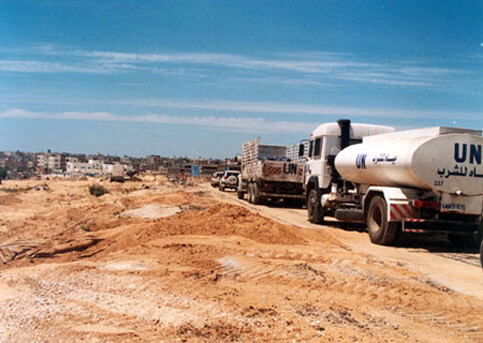United Nations Relief and Works Agency for Palestine Refugees in the Near East 3 November 2006

UN assistance arrives to Beit Hanoun (UNRWA)
The latest Israeli military siege on the northern Gaza Strip town of Beit Hanoun began on 1 November, greatly disrupting the lives of residents, the overwhelming majority of whom are Palestine refugees. UNRWA operations in the area have been severely hampered.
As of 3 November, of the thirty-nine Palestinians killed, at least two are Palestine refugees: one four-year-old boy and one 42-year-old woman.
Due to the Israeli military-imposed curfew, all 10,450 children enrolled in the 10 UNRWA schools in the Beit Hanoun area were unable to attend classes. Four of these schools were damaged during an Israeli military operation in the summer. UNRWA’s Health centre is also closed, as the nearly 60 staff members residing in Beit Hanoun cannot report to work. Other UNRWA operations have also been disrupted. In addition, the Israeli military destroyed phone lines, cut electricity in the area and food and water supplies are scarce.
Three UNRWA humanitarian convoys entered Beit Hanoun on Friday afternoon, and delivered food, water, milk, blankets and mattresses. UNRWA also sent a medical team to the Beit Hanoun health clinic to provide much-needed health services to the population there. UNRWA staff delivering humanitarian supplies noted significant damage to roads and houses as well as the presence of several Israeli military bulldozers and five tanks, close to Beit Hanoun hospital.
On Friday, 3 November, 30 to 40 women gathered inside UNRWA Elementary A and B Co-Educational Schools, apparently under Israeli military orders. Two women had suffered gunshot wounds. UNRWA intervention enabled ambulances, initially forbidden entry, to transport the injured women to Beit Hanoun hospital. The Israeli military took the remaining women to a military camp where, that morning, groups of men from Beit Hanoun had been taken. The women were released later on Friday and were told by the Israeli military to return to their homes.
Dua’, an UNRWA staff member, reported that while at home at 12 am the night the Israeli military began the military operation, she was awakened by loud explosions and the firing of helicopter rockets. Tanks and bulldozers had surrounded the area and the Israeli military set up camps across from her home. She and her family didn’t manage to sleep that night.
Speaking on the phone on Friday, the 25 year-old mother of two said, “We haven’t slept in three days. At any moment they [the Israeli military] can enter your house to ask to speak to someone. You have to keep alert - you have to be awake all the time in order to open the door [to the Israeli military] at any time”.
Dua’s said that her 12 month-old baby and two-year old toddler hide under the blankets when they hear the loud sounds of the Israeli military artillery.
She notes that as they were not expecting the military operation, they did not stock up on food ahead of time and only had a small amount of bread in the house the first day of the military operation. She says she has already used the one can of liquid milk she had and that the powdered milk, diapers and cheese will run out today. Due to the curfew, Dua’ can’t leave home to buy food.
“I can’t leave home because I’m afraid to be shot”, she says.
Although in her area of Beit Hanoun the electricity - albeit weak - and the water are back on as of Friday, blackouts and water shortages are widespread across Beit Hanoun.
Dua’ and other UNRWA staff members are anxious and are uncertain when they will be able to return to their jobs assisting Palestine refugees.
Related Links